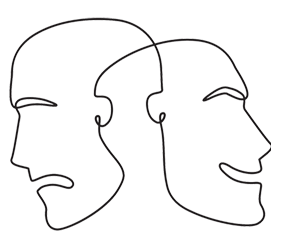Emotional Addiction
The Impact of Emotional Addiction
When we think of addiction, we often associate it with substances like drugs or alcohol. It can also involve behaviors such as eating, gambling, or sex.

Support
Emotional Addiction
When we think of addiction, we often associate it with substances like drugs or alcohol. It can also involve behaviors such as eating, gambling, or sex. However, there's another type of addiction that’s less known and more internal: emotional addiction. Many of us have been taught to tolerate emotional ups and downs, but sometimes, our emotions can lead us to harmful patterns.
Unlike substance addictions, emotional addiction is more subtle and often lasts longer. It shapes how you view the world and respond to situations. Recognizing these negative patterns is essential to overcoming emotional addiction, along with learning healthier ways to manage your emotions.
What Is Emotional Dependence?
Emotions hold immense power. When balanced with logic and reason, they can enhance your ability to be productive, care for yourself, and maintain healthy relationships. However, emotions can also override rational thinking, leading us to ignore consequences—this is particularly true for someone with emotional addiction.
Emotional addicts become fixated on experiencing a specific mood or reacting to intense emotions. These emotions can trigger chemical changes in the brain similar to those caused by addictive substances. People with emotional addiction may rely on certain emotions for comfort, distraction, or escape. Over time, this dependence becomes an obsession or compulsion, turning into an addiction.
Those who struggle with emotional addiction may feel as if their emotions control their lives, filtering every situation through a default emotional lens. This can lead to prioritizing emotions over more effective problem-solving methods, resulting in negative consequences like:
- Poor decision-making
- Impulsive actions
- Lack of self-control or planning
- Reduced productivity
- Damaged relationships
In times of high stress, individuals who rely on emotions for relief may turn to other unhealthy coping mechanisms, such as drugs or alcohol.
Emotional addiction can also be seen as an emotional habit. Just as habits form through repeated behavior, emotional habits develop when your body automatically reacts emotionally to various situations. Over time, that emotion becomes your default response to the world. For instance, if anger is your go-to emotion, you may find yourself relying on it whenever you feel uncertain. Paradoxically, this can even bring a sense of calm.
How to Break Free from Emotional Dependence
Building emotional resilience is key to overcoming emotional addiction and changing these ingrained habits. Emotional resilience means becoming aware of your emotions and learning to manage them effectively. As you break free from emotional addiction, you allow your body to recover from the chemical highs of emotional responses and begin the process of natural healing.
Here are some strategies to help you develop emotional strength and overcome emotional dependence:
1. Identify your emotional habits: Emotional addiction may feel like it has always been a part of you, but by paying attention to your reactions in daily life, you can start to notice patterns. Once you recognize these patterns, you can begin to take control.
2. Rewire your brain's reward system: Whether through daily affirmations or meditation, aim to create meaningful change. When an emotion starts to overwhelm you, give yourself time to cool down, even if it means stepping away from a situation. Some people find mantras helpful in tense moments.
3. Avoid dwelling on negative events: Ruminating rarely leads to insight; it often just reinforces the upset. When you catch yourself brooding, try to shift your focus to something productive, like exercise, a puzzle, or even watching TV.
4. Nurture your self-esteem: Realizing you have an emotional addiction may stir feelings of shame or guilt. Be compassionate with yourself. Self-esteem acts like an emotional immune system and can be built up over time with care. Focus on your strengths and the possibility of a brighter future.
5. Be patient with the process: Emotional addictions usually develop over many years, so expecting immediate change is unrealistic. Stay committed to the work but give yourself breaks when needed. It takes time to rewire your brain’s responses to different situations. Celebrate small victories and keep moving forward.
Let's Talk
You will receive a 15 minute phone call from our group leader, as an introduction to the program and to discuss suitability. This is free and without obligation.


















